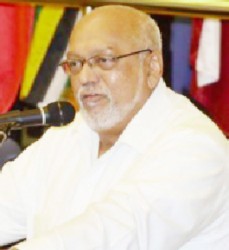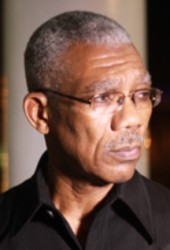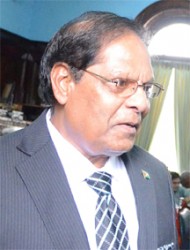President Donald Ramotar yesterday announced a plan to make an appeal to the Caribbean Financial Action Task Force (CFATF), following his administration’s inability to win the necessary opposition support to pass amendments to the anti-money laundering laws recommended by the body.
At a news conference yesterday, Ramotar said the actions of APNU and the AFC has forced him to re-examine his government’s future relations with the opposition. APNU and the AFC also came in for criticism from the Private Sector Commission (PSC) for voting against the bill to amend the Anti-Money Laundering and Combatting the Financing of Terrorism Act in accordance with a number of recommendations made for countries in the region including Guyana, by CFATF. However, both stood their ground yesterday, maintaining arguments that the bill in its current form is inadequate and the call for set up of the Public Procurement Commission as a prerequisite for support.

“I have charged my two representatives to the CFATF – Minister of Legal Affairs and Attorney General Anil Nandlall and Director of the Financial Intelligence Unit Paul Geer – to explore thoroughly ways of dealing with the impact of the opposition’s actions in rejecting the Anti-Money Laundering and Combating the Financing of Terrorism amendment Bill,” Ramotar said at a press conference held at the Office of the President yesterday afternoon.
He said that Nandlall and Geer are expected to make an appeal to the CFATF at the upcoming plenary just over a week from now but he is not sure whether this appeal – bolstered by the fact that the government intended to pass the amendments – would strike a chord with CFATF and gain its mercy. “One of the appeals we could make is that government had the political will and the desire to move this bill ahead. Whether it will have any impact that is left to be seen,” he noted.
He accused the opposition of doing everything to drag its feet to filibuster the passage of the bill. “They have not put forward any suggestions for the bill,” he said. “They were talking about going back to a select committee…we were ready to go back to a select committee. We just wanted a timeline because this is the month when the CFATF decides [on it]. They have refused,” he added, while arguing that had the amendments been passed, there would have been the creation of a strong investigative arm with links to the police with a view to conducting investigations on financial crimes and money laundering.
Warning of the implications of the failure to pass the amendment bill, Ramotar said the smooth transfer of money to external banks will be impeded or terminated. He also claimed that “an overseas bank has already severed ties with the local banks,” and later identified it as Citibank.
“What is worse is that long before they cast their vote the opposition was well aware of these consequences. Clearly the opposition parties are determined to damage the economy and the body politic. They are well aware of that their actions will cause. They were briefed fully on this matter,” he said.
“Their actions last night will forever go down as the worst form of economic sabotage by the opposition,” he said. “All hope is now lost that the opposition has any intention of being a partner in developing this country. It is in this context that I am forced to re-examine my government’s future relationship with the opposition political parties,” he added.
According to Ramotar, the vote against the bill clearly demonstrated that the opposition was “responsible to no one, to no organisation, to no social institution,” and he reiterated previous claims that it has breached every parliamentary “norm, convention and principle” since the start of the 10th Parliament.
He said that the opposition has consistently shown scant regard for the private sector, the labour movement, the rice farmers, and the teachers among others, “many of whom are part of their constituency.”

In a statement issued yesterday, the PSC also registered its “disgust” at the opposition’s treatment of the amendment bill and a PSC petition to the National Assembly that was also voted down. As a result, it said the opposition saw it fit, despite the economic importance of the private sector, to deny a voice to the very people who drive the economy and employ a high percentage of the nation’s citizens.
“This action reveals an inexplicable contempt for the stakeholders of this country and/or a lack of understanding of how the economy functions. In a civilized world, on critical matters of economic and national importance, it is mandatory for leaders to rise above this petty and often retrogressive tit for tat disposition,” it added, while noting its “deep disappointment” over the actions of Parliament and emphasising that it would hold it accountable for any damage that may accrue to the economy going forward.
‘Political will’
At a news conference yesterday, APNU leader David Granger said CFATF was not going to be moved by the simple passage of a bill in the National Assembly.
Granger said that Guyana will be judged by its performance, “its ability to enforce the legislation by having a strong FIU (Financial Intelligence Unit) which brings charges and prosecutions. You are looking at political will. You are looking at governmental behaviour.”
Reading from a prepared statement, Granger also said that it is clear that the bill had significant deficiencies, which the opposition just could not support. He added that the government insisted on putting the bill to a vote despite “strong recommendations” by APNU and AFC that it be returned to the Select Committee to correct those deficiencies, but these were rejected. In was in this regard, he explained, that the National Assembly was forced to vote against it to prevent an inadequate, incomplete and imperfect bill from being “foisted on the Guyanese people.”
He stressed that APNU is committed to amending the law to ensure that it is effective as well as ensuring that the Bank of Guyana and the Financial Intelligence Unit are empowered and equipped to fulfil its functions and achieve the objectives of the law.
Granger said that APNU also stands committed to engaging the government, the private sector, civil society, the trade unions and the international community to protect our economy with enforceable anti-money laundering laws.
Meanwhile, the AFC yesterday said that it will not fall prey to the government’s anti-money laundering propaganda, while accusing the administration of trying to put fear into the minds of Guyanese. AFC leader Khemraj Ramjattan told a press conference that Guyanese have been rushing banks and cambios for foreign currency. “It is the fear of this that the government is out there propagandising, all the madness, that might have very well caused that to happen,” he said.
“We have been very consistent that we did not see the passage of the Anti-Money Laundering amendment separate and distinct from the enforcement of other mechanisms that would have brought benefit to our people,” AFC Vice Chairman Moses Nagamootoo said, while stressing that a Public Procurement Commission would have been the ideal prerequisite to rid money laundering and ensure that contracts were not abused for “political patronage.”

“You cannot fix a ship by repairing a sail,” he declared. “The government wants to use the anti-money laundering legislation as a sail, as if that was the only thing required but to get it going you would have to plug the hole.”
Nagamootoo argued further that the government should shoulder the blame for the non-passage of the bill since it dithered in bringing the law up to standard and was instead absorbed in political advertising. “The government was not concerned about the consequences really it was concerned about propaganda that it could make to terrorise the Guyanese people… to make the so-called wicked opposition look bad,” he said.
He also said that the AFC stance against the bill was not intended to harm the private sector. He noted the private sector has been misinformed and the party has not demonstrated “unfriendliness” to it and instead had “always seen the private sector as a partner in this very difficult task to bring about fiscal responsibility, transparency and good governance in Guyana.” “These are the prerequisite that are necessary for good healthy business environment and our position on measures in the parliament and issues of public import is not meant to harm the private sector but to facilitate it…to be able to have that enabling environment in which they can do better…,” he said.




